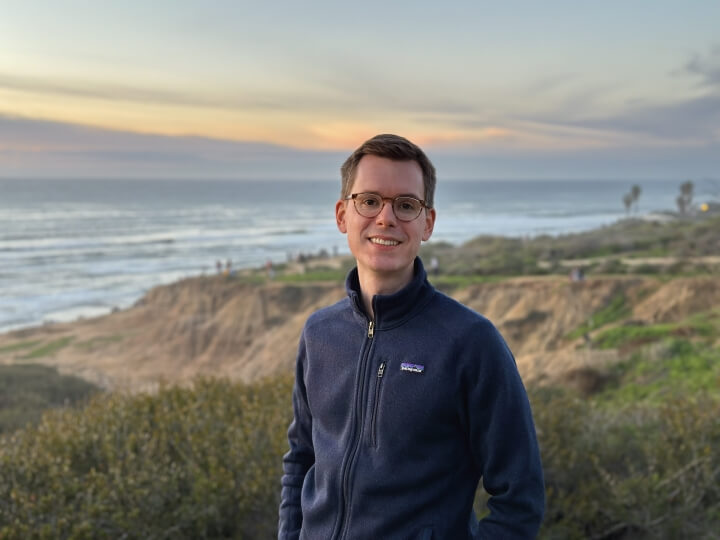Tobias Egle, S.M., '19, Ph.D. '22
Had it not been for an impromptu chat at a networking event, Tobias Egle might never have considered studying in the United States, meaning he never would have found his way to the Harvard John A. Paulson School of Engineering and Applied Sciences (SEAS). Growing up in Germany, few people in his circle pursued educational or career opportunities overseas. After finishing his undergraduate degree in chemical engineering in Germany, he took a job with international chemical producer BASF, staying within the borders of his home country.
BASF eventually offered him a position in Shanghai, giving Egle his first taste of another country. Upon his return, he attended a BASF networking event. He hit it off with a visiting researcher at Lawrence Livermore National Laboratory in California, where he’d eventually go to finish his master’s degree in chemical engineering.
“There’s this thirst to just go places and leverage the time as a student when you can travel, do different projects while furthering your education,” Egle said. “So, I chose a master’s research thesis that would allow me to travel to the U.S. I scoped out a really interesting project at Livermore. I was there for a year, having a terrific time both in the lab and in my personal life.”
Egle so enjoyed his time in the U.S., he decided to stick around to pursue a Ph.D. He was accepted as a materials science and mechanical engineering student at Harvard, working in the lab of Cynthia Friend, Theodore William Richards Professor of Chemistry and Professor of Materials Science, Emerita at SEAS. His research at the intersection of materials science and physical chemistry aimed to explore energy sustainability, focusing on the fundamental interactions and behaviors of silver-palladium alloys and its interfaces. He even had to build a specialized vacuum chamber to conduct his experiments.
“I was always fascinated by the nuts and bolts of big reactors at BASF,” Egle said. “It felt like half the time I had a wrench in my hand at SEAS to tinker around, because things had to be customized frequently to carry out specific experiments. Some parts of the vacuum chamber also broke occasionally, so they had to be fixed. It was this home-built apparatus that my friends said looked like a spaceship.”
Egle hasn’t been in the lab as much since earning his degree in 2022. He transitioned to venture capital and investment at M Ventures, the strategic investment fund for Merck KGaA, Darmstadt, Germany, an international science and technology company. Still based in Boston, Egle uses his materials science expertise to help companies producing semiconductor, photonic or sustainability technologies get off the ground.
“My materials science background and semiconductors are very close to each other,” Egle said. “Especially the work on vacuum chambers is quite applicable to the techniques used in the semiconductor industry to measure and to manufacture stacks of thin films. A microchip is a sandwich of different conducting, isolating or semiconducting materials which are patterned and interconnected to each other. Designing the various interfaces of this sandwich is just like the work I did. It’s an exciting topic, and I continue to learn a lot now about how some of the techniques I encountered in my research are relevant and used in the semiconductor industry, just on a completely different scale and precision.”
While at Harvard, Egle also took on leadership roles in multiple student organizations, including the SEAS Graduate Student Council, Kenneth C. Griffin Graduate School of Arts and Sciences and LGBTQ@GSAS. He was also part of the taskforce on diversity, inclusion and belonging appointed by then-SEAS Dean Frank Doyle.
"In my undergrad in Germany, I was incredibly siloed into the chemical engineering department," he said. "I never got to know a law student, or a policy person, or anyone else."
At Harvard, there were all these opportunities to get involved in these larger organizations and to hear vastly different perspectives across campus.
Working at M Ventures doesn’t only take advantage of Egle’s technical expertise, but the social and communication skills he learned through those organizations. Not every founder or business officer he talks to will have a Ph.D. in engineering, and interacting with so many non-engineers at Harvard helped him learn how to speak to a wide range of audiences.
“I’m still working on that, because it’s really hard,” he said. “Coming from this scientific background, you’re trained to be the expert. It can still happen to me where I end up going into way too much detail.”
When he does talk to engineers, however, Egle still draws on that degree.
“In the venture capital landscape, semiconductor specialists are a rarity,” he said. “Putting on my 'Ph.D. hat,’ I engage founders in technological discussions, streamlining our decision-making process.”
Egle almost found himself on the other side of venture capital. In his last two years at Harvard, he explored founding a company that could sustainably source the lithium used in batteries, with the overall goal of helping decarbonize the mineral supply chain for batteries used in electric vehicles. When that company couldn’t find a market fit to move forward, he began searching for other career opportunities. And just like how his journey to Harvard began with an impromptu conversation, another conversation with a colleague led him to where he is now.
“Being curious can be your biggest superpower,” he said. “Whenever I had the chance, I benefited from exploring and talking to people. Most people are super happy talking about their expertise or experiences. The worst thing you can get is just a ‘no.’”
Press Contact
Matt Goisman | mgoisman@g.harvard.edu
